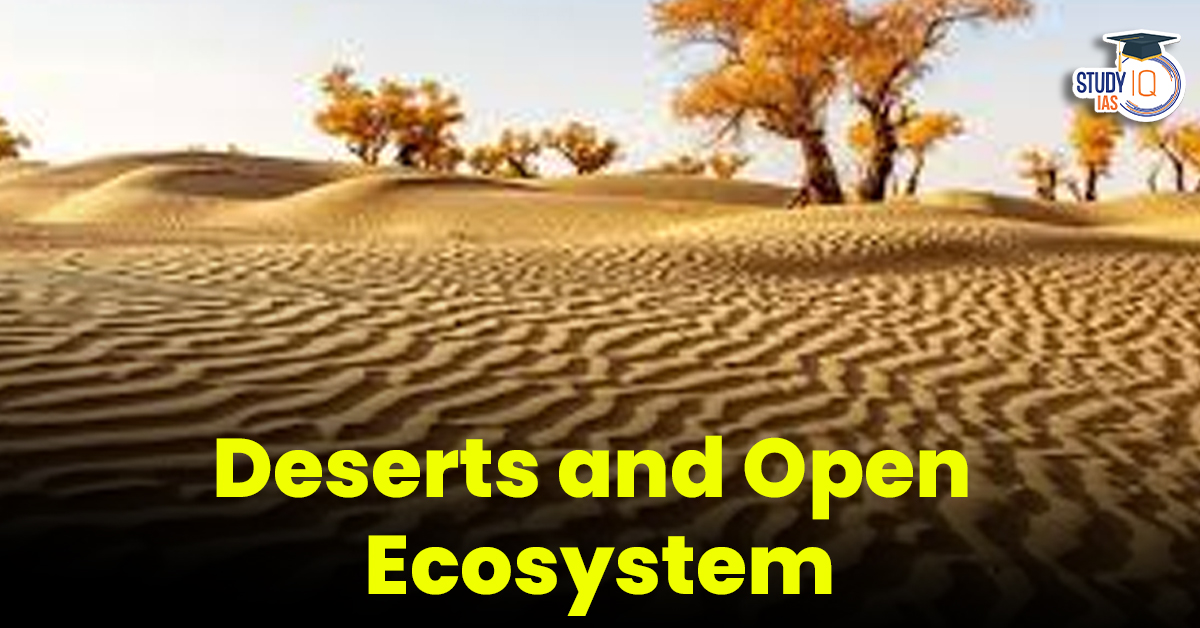Table of Contents
Context: Deserts and open natural ecosystems are often wrongly viewed as wastelands, leading to misguided “greening” efforts.
Importance of Deserts and Open Ecosystems
- Biodiversity Hotspots: Deserts are home to uniquely adapted plants and animals (e.g., Great Indian Bustard, caracal, Indian wolf).
- These species are found nowhere else, making deserts vital for global biodiversity.
- Cultural and Historical Significance: Early civilisations like Mesopotamia, Egypt, and the Indus Valley arose in or near deserts.
- Indigenous communities (Dhangar, Rabari, Kuruba) depend on deserts for their traditional livelihoods.
- Resilience and Adaptation: Deserts and their communities have developed resilience and ingenious survival strategies, crucial for understanding adaptation to extremes.
- Carbon Storage: Deserts, grasslands, and savannas store significant carbon in their soils, contributing to climate regulation.
- Ecosystem Services: Regulate hydrology, support migratory species, and maintain ecological balance in dryland regions.
India’s Shortfalls in Desert and Open Ecosystem Conservation
- Policy Neglect and Misclassification: Vast open natural ecosystems are officially mapped as “wastelands,” ignoring their ecological value.
- Policies often focus on converting them into forests or agricultural land.
- Loss of Native Ecosystems: Afforestation and “greening” schemes often use non-native species, leading to habitat loss and ecosystem disruption.
- Undervaluing Pastoralist Roles: Traditional pastoralist groups, crucial for biodiversity stewardship, lack recognition and support.
- Weak Legal Protection: Deserts and grasslands have limited or no dedicated legal safeguards compared to forests.
- Inadequate Restoration Efforts: Restoration projects often emphasise tree planting over restoring native vegetation or conserving soil and water.
What Should Be Done?
- Recognise and Protect Open Ecosystems: Update land-use policies to value deserts, grasslands, and savannas as vital, not “wastelands.”
- Legally safeguard these ecosystems from conversion.
- Support Pastoralist and Indigenous Communities: Involve local groups in conservation and restoration.
- Provide incentives and recognition for sustainable grazing and land stewardship.
- Promote Native Restoration: Restore degraded drylands by protecting native plants, soil, and moisture, rather than monoculture plantations.
- Adopt Low-Tech, Nature-Based Solutions: Emphasise water harvesting, rotational grazing, and protection of natural regrowth.
- Policy Reforms and Awareness: Shift focus from “greening deserts” to maintaining ecosystem diversity and resilience.
- Celebrate and promote the value of deserts (e.g., rename World Day to Combat Desertification to World Day to Combat Land Degradation).
- Reward Ecosystem Services: Develop incentives for carbon storage in soils and biodiversity maintenance by communities.


 Geological Heritage Sites of India: Sign...
Geological Heritage Sites of India: Sign...
 Wildlife Sanctuaries of India 2026: List...
Wildlife Sanctuaries of India 2026: List...
 National Parks in India 2026: Complete S...
National Parks in India 2026: Complete S...

























